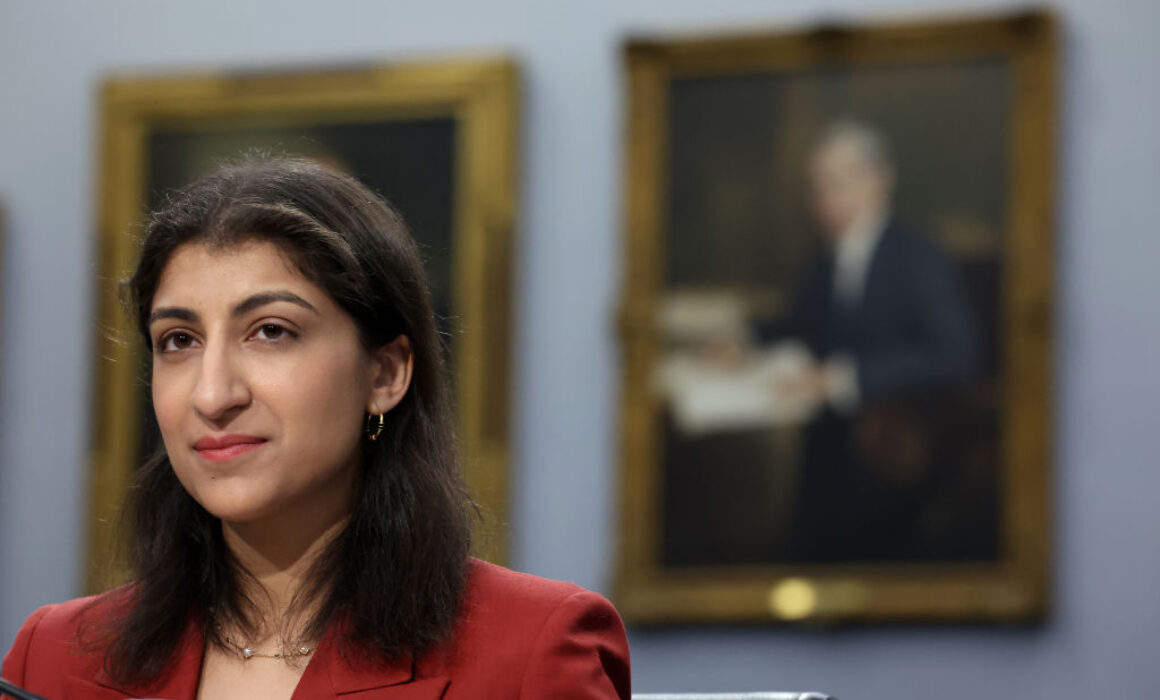What Antitrust Could Look Like Post–Lina Khan
December 6, 2024
The next administration’s volatility may be bad for business.
The Roosevelt Rundown features our top stories of the week.

Lina Khan, chair of the Federal Trade Commission (FTC) (Kevin Dietsch/Getty Images)
“Innovation Demands Regulatory Stability, Not Chaos”
The arrival of a second Trump term has delighted much of corporate America, whose executives expect their profits to soar as the administration abandons the Lina Khan and Jonathan Kanter–led antitrust efforts of the past four years. But “C-suite leaders should be careful what they wish for,” Niko Lusiani, Roosevelt’s director of corporate power, writes in Washington Monthly. The Trump era “might feel more business-friendly until, rapidly and unpredictably, it is not.”
If Trump’s past is precedent, the next four years could see more instability and rampant favoritism. An antitrust strategy “based more on volatility than reason” would stifle “the innovation businesses claim to champion,” Lusiani argues. “Regulators pursuing penalties without a transparent rationale turn companies defensive.”
As a result of this unpredictability, it’s unclear what the new administration will do with the federal government’s active battles against Big Tech—such as those against Google. The tech giant has been accused of paying off rivals to keep its search engine dominant, which allows it to “extract value from its customers by reducing its quality and increasing its prices,” Lusiani and Roosevelt Fellow Ketan Ahuja write for MSNBC. While banning such payments could “restore the incentives of distribution partners such as Apple and Samsung to compete with Google,” such a remedy wouldn’t go as far as to “give newcomers access to distribution channels and other capabilities they need to actually innovate.” (Ahuja expands on this concept in a Roosevelt brief released in June.)
Last month, the DOJ proposed in its antimonopoly suit against Google that the company sell its web browser, Chrome, to reduce its dominance over online search. While this is a promising start, Lusiani and Ahuja write that actually fueling competitive, innovative search engines will require a business model for internet browsers that serves internet users, not corporate backers.
If it’s innovation companies claim to want, it’s competition they must abide by. And as Lusiani asserts in Washington Monthly, “Innovation demands regulatory stability, not chaos.”
Undergrads: Join the Roosevelt Network
Applications for the Roosevelt Network’s three undergraduate policy fellowships close this Sunday, December 8. If you have any aspiring policy professionals studying economics, political science, or related fields in your professional communities, encourage them to apply for one of the Network’s opportunities, which are tailored to students near the beginning, middle, and end of their college careers.
For applicants interested in learning more or those considering applying next cycle, join the Network for its 2025 Winter Policy Expo, which will be held virtually on January 17 from 2:00–5:00 pm. Roosevelt staff will be joined by fellows as well as Network alumni, who have gone on to pursue graduate degrees in law, policy, and economics and start careers at government offices, political parties, research firms, nonprofits, and more.
What We’re Talking About
Incredible graphic from @stacyfmitchell and @ilsr: The collapse of antitrust enforcement in the grocery industry has fueled the consolidation of power among big grocery chains, paving the way for them to raise prices and expand margins at the expense of families. pic.twitter.com/SjREI8mqWk
— Elizabeth Pancotti (@ENPancotti) December 4, 2024
What We’re Reading
- A new Treasury report urges the IRS to warn taxpayers about the hidden fees that tax preparation companies extract from those who use their services. Roosevelt Fellow Portia Allen-Kyle told the Washington Post, “We don’t want corporations to be the middleman brokers for what should be free government services.”
- Read Roosevelt’s Emily DiVito and Matt Hughes on the importance of a public tax filing option like Direct File.
- “That’s not gonna happen,” Todd Phillips told American Banker in response to whether Elon Musk could actually get rid of the CFPB, which would require an act of Congress. “As much as the industry dislikes how vigorous Director [Rohit] Chopra has been, they don’t want to see the agency abolished.”
- Roosevelt Fellow Diana Hernandez spoke with the Associated Press about how weather disasters and power outages hurt disabled people, who may suffer from unregulated temperatures, rely on electricity-operated breathing machines, or simply struggle to pay their utility bills.
- The Department of Labor has issued a proposed rule that would eliminate the subminimum wage for people with disabilities—which has, for decades, legally allowed employers to pay disabled workers as little as 25 cents per hour.